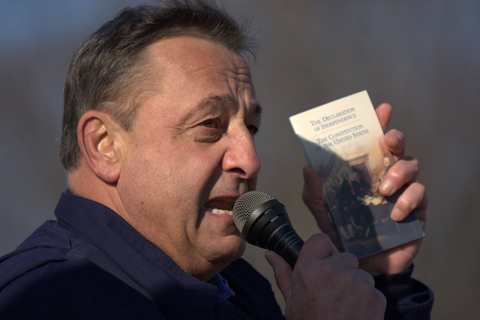
WAVING THE CONSTITUTION While campaigning in 2010, Paul LePage frequently carried the US Constitution. |
In his stump speech, LePage emphasized his rags-to-riches story, his success at Marden's and Waterville city hall, and the need to cut government regulations and spending. He touted his opposition to abortion and approval of creationism being added to the school curriculum. He appeared at Tea Party rallies, waving a copy of the Constitution and warning the freedoms guaranteed within were being trampled on. "He basically conned the Tea Party movement that he was one of them," says former state Tea Party Patriots coordinator Andrew Ian Dodge, a primary challenger to US Senator Olympia Snowe. "He told them exactly what they wanted to hear . . . then he supported Snowe and took all the wind out of the movement's sails."
With the Tea Party at its zenith, LePage had won the support of Pete "the Carpenter" Harring, the boisterous head of the Maine Refounders, and three wealthy Bristol retirees active in the Constitutionalists of Maine: Dana Dyer was an instructor at the National Center for Constitutional Studies, the ultraconservative institute founded by the infamous Mormon conspiracy theorist (and John Birch Society loyalist) Cleon Skousen, whose writings inform many of Glenn Beck's rants; Philip Congdon was a retired manager at Texas Instruments; Ralph Hassenpflug was a commodities trader for a German hedge fund. All four would later serve on his transition team. Congdon would also serve as LePage's economic and community development commissioner until forced to resign for making racially charged remarks at a public forum in Caribou last April.
Previously, LePage had never raised more than $6500 for a campaign. In the primary, Swanson pulled in more than $178,000, less than half that of establishment favorite Steve Abbott, and a fraction of Les Otten's $2.75 million war chest, 95 percent of which was self-financed. Early LePage supporters included his kitchen cabinet, the Mardens, eccentric columnist John Frary, and future house speaker Bob Nutting (who LePage has said told him he had little chance of winning). Only as momentum began to build in the final weeks before the primary did conservative clans like the Quirks, Cianchettes, and (Linda) Beans get onboard.
Nonetheless, the appeal to the Tea Party and social conservatives paid off, as did the January arrival of Brent Littlefield, a Maine native and DC-based political consultant credited with skillfully targeting French speaking voters and with convincing LePage to make more use of his early life story. (Littlefield is now LePage's senior political adviser.) On June 8, LePage crushed his six GOP rivals under a tidal wave of new voters, garnering more votes than the next two candidates combined. "We called people who had participated in two of the past five primaries, and LePage wasn't even on the radar," says Peter Mills's pollster Mark Smith, who said LePage never polled higher than fourth. "But there were large numbers of primary people who hadn't voted before, and we never saw them coming." Smith suspects many of the newcomers had registered to vote against gay marriage the previous November, and had since embraced a Tea Party philosophy.